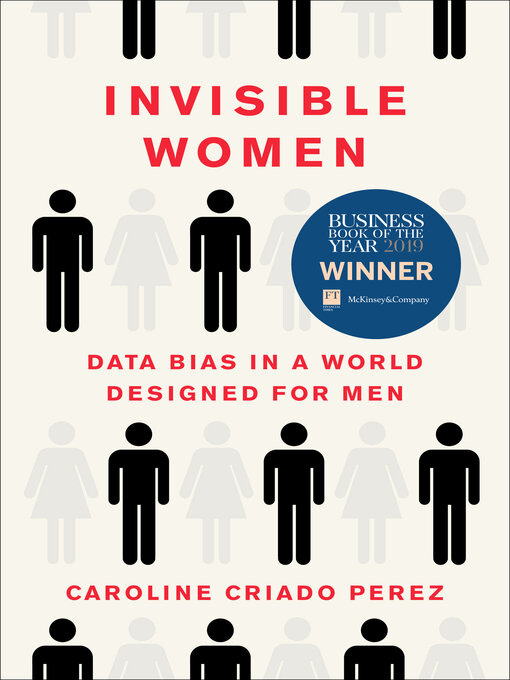#1 International Bestseller * Winner of the Financial Times and McKinsey Business Book of the Year Award * Winner of the Royal Society Science Book Prize
Data is fundamental to the modern world. From economic development to health care to education and public policy, we rely on numbers to allocate resources and make crucial decisions. But because so much data fails to take into account gender, because it treats men as the default and women as atypical, bias and discrimination are baked into our systems.
And women pay tremendous costs for this insidious bias: in time, in money, and often with their lives.
Celebrated feminist advocate Caroline Criado Perez investigates this shocking root cause of gender inequality in Invisible Women. Examining the home, the workplace, the public square, the doctor's office, and more, Criado Perez unearths a dangerous pattern in data and its consequences on women's lives.
Product designers use a "one-size-fits-all" approach to everything from pianos to cell phones to voice recognition software, when in fact this approach is designed to fit men. Cities prioritize men's needs when designing public transportation, roads, and even snow removal, neglecting to consider women's safety or unique responsibilities and travel patterns. And in medical research, women have largely been excluded from studies and textbooks, leaving them chronically misunderstood, mistreated, and misdiagnosed.
Built on hundreds of studies in the United States, in the United Kingdom, and around the world, and written with energy, wit, and sparkling intelligence, this is a groundbreaking, highly readable exposé that will change the way you look at the world.
-
Creators
-
Publisher
-
Release date
March 12, 2019 -
Formats
-
Kindle Book
-
OverDrive Read
- ISBN: 9781683353140
-
EPUB ebook
- ISBN: 9781683353140
- File size: 1152 KB
-
-
Languages
- English
-
Reviews
-
Library Journal
March 1, 2019
In her introduction, Perez (Do It Like a Woman) explains that data bias toward men over women is both caused and perpetuated by "male universality" or "the presumption that what is male is universal" and that this failure to give equal consideration to the female perspective has put women's lives and livelihoods at risk. The bulk of the book is filled with copious examples of how this lack of female-specific data negatively affects and disadvantages women across myriad situations. The examples are divided into sections on daily life, the workplace, design, going to the doctor, public life, and when it goes wrong (conflicts, pandemics, and natural disasters). Perez concludes with an afterword in which she advocates for a shift toward the female focus that gives particular attention to the themes that appear frequently in the data bias examples--the female body, male violence against women, and women's unpaid care burden--and for increased female representation in decision-making and knowledge production as a means to make this happen. VERDICT Exhaustively researched and well argued, this volume will appeal to anyone curious about equality and social justice topics.--Sara Holder, Univ. of Illinois Libs., Champaign
Copyright 2019 Library Journal, LLC Used with permission.
-
Kirkus
January 15, 2019
A writer, broadcaster, and feminist activist exposes a global knowledge gap in data pertaining to gender.Criado Perez (Do It Like a Woman...and Change the World, 2015), who was named Liberty Human Rights Campaigner of the Year in Britain in 2013, takes on the challenge of telling the story of the unknown, addressing countless ways in which data about women have been--and continue to be--left out of research that informs everything from daily life to public policy. The author provides an incisive narrative paced more like a novel than a scientific study, offering digestible information with a sharp dose of wit. From heart attack symptoms to usage of public transportation, women's patterns don't always replicate men's. However, like algorithms seeking simplicity, researchers may set aside differences as "atypical," thus missing the data-rich point that while women's perspectives aren't necessarily problematic, ignoring them is. Painting a portrait out of negative space--this is "a story about absence--and that sometimes makes it hard to write about"--Criado Perez draws attention to information gaps in fields as diverse as urban planning, tax law, design, medicine, technology, disaster relief efforts, and politics. In focusing on how research has ignored, obscured, or failed to address gender differences, the author offers a balance of statistics, provocative questions, and concise assessments of systemic bias and how to address it. She pinpoints how the personal and the political intersect in these data gaps, providing a lens to interrogate gender-neutral defaults and reveling in examples of how including women (sometimes a single woman) quickly "solves" persistent problems. In clear language, the author builds a strong case for greater inclusion with this thoughtful and surprisingly humorous view of institutional bias and gendered information gaps.While some readers may suggest that equality has arrived and gender no longer matters, this book, which should have wide popular appeal, is a solid corrective to that line of thought.COPYRIGHT(2019) Kirkus Reviews, ALL RIGHTS RESERVED.
-
Formats
- Kindle Book
- OverDrive Read
- EPUB ebook
subjects
Languages
- English
Loading
Why is availability limited?
×Availability can change throughout the month based on the library's budget. You can still place a hold on the title, and your hold will be automatically filled as soon as the title is available again.
The Kindle Book format for this title is not supported on:
×Read-along ebook
×The OverDrive Read format of this ebook has professional narration that plays while you read in your browser. Learn more here.


